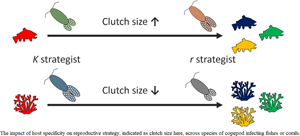Published online by Cambridge University Press: 13 December 2021

Environmental stability can have profound impacts on life history trait evolution in organisms, especially with respect to development and reproduction. In theory, free-living species, when subjected to relatively stable and predictable conditions over many generations, should evolve narrow niche breadths and become more specialized. In parasitic organisms, this level of specialization is reflected by their host specificity. Here, we tested how host specificity impacts the reproductive strategies of parasites, a subject seldomly addressed for this group. Through an extensive review of the literature, we collated a worldwide dataset to predict, through Bayesian multilevel modelling, the effect of host specificity on the reproductive strategies of parasitic copepods of fishes or corals. We found that copepods of fishes with low host specificity (generalists) invest more into reproductive output with larger clutch sizes, whereas generalist copepods of corals invest less into reproductive output with smaller clutch sizes. The differences in host turnover rates through an evolutionary timescale could explain the contrasting strategies across species observed here, which should still favour the odds of parasites encountering and infecting a host. Ultimately, the differences found in this study reflect the unique evolutionary history that parasites share both intrinsically and extrinsically with their hosts.